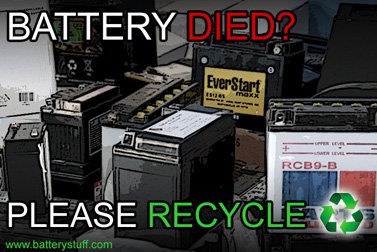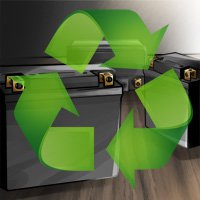What Do I Do With My Old Dead Battery?
ALL ABOUT BATTERY RECYCLING
When you see a price for a new battery at BatteryStuff.com, there is no core charge. What you see is what you get. Please do not send us your old batteries by mail. Not only is it expensive, but it may be considered hazardous. However, if you stop by any of our locations, you can drop off your old battery and we'll gladly take it off your hands. Free of charge. Any business that sells batteries will also accept them for battery recycling.
Battery cores are important because not only is lead expensive, but it can be recycled and used again in the manufacturing of new batteries. As a matter of fact, approximately 97%* of lead content within lead acid batteries is recycled. That's not too shabby when you consider how aluminum, newspaper, and glass get recycled ~50% of the time or less. In a nutshell, battery recycling works, and it's a good idea to keep it up.
There are four parts of the battery that are recycled. They are the plastic case, the lead content, the sulfate crystals, and the electrolyte. For more detail about the construction of lead acid batteries, watch this video tutorial. But for now, let's go through each part and find out exactly how it is recycled.
Plastic Case
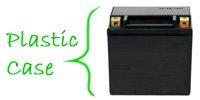 The old dead battery is broken down and crushed into pieces. CRUNCH. The pieces are separated by dumping everything into a vat. They collect the floating plastic while the heavy metal collects at the bottom. The material scooped up at the surface is called polypropylene. These are washed and, like most other plastics, melted down into what are called 'plastic pellets'. You can make anything you want with these pellets. They are usually sold back to battery manufactures as the building blocks for new battery cases.
The old dead battery is broken down and crushed into pieces. CRUNCH. The pieces are separated by dumping everything into a vat. They collect the floating plastic while the heavy metal collects at the bottom. The material scooped up at the surface is called polypropylene. These are washed and, like most other plastics, melted down into what are called 'plastic pellets'. You can make anything you want with these pellets. They are usually sold back to battery manufactures as the building blocks for new battery cases.
Lead Content
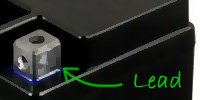 Remember the part with the vat? So if the plastic was scooped up, the rest was sorted afterward. The lead content from the plate grids, terminals, and posts have to be free from contaminants. Luckily, lead is heavy stuff, and because it's a metal, can be melted and purified by being poured into molds (they call them hogs or pigs, depending on their size). The bad stuff rises to the top and is scrapped off while the pure lead is left to cool and harden into plates again. The new plates are also sold to battery manufactures and are melted again for the formation of new battery plates.
Remember the part with the vat? So if the plastic was scooped up, the rest was sorted afterward. The lead content from the plate grids, terminals, and posts have to be free from contaminants. Luckily, lead is heavy stuff, and because it's a metal, can be melted and purified by being poured into molds (they call them hogs or pigs, depending on their size). The bad stuff rises to the top and is scrapped off while the pure lead is left to cool and harden into plates again. The new plates are also sold to battery manufactures and are melted again for the formation of new battery plates.
Sulfate Crystals
 Sulfation build up is usually the cause of battery failure. These crystals attach to the plates of the battery and rob you of power. As a result of battery recycling, the crystals are collected and sometimes all of the electrolyte is allowed to sulfate, to produce more crystals. The sulfation is processed and becomes a white powder that is often used in laundry detergent, glass, and textile manufacturing. Who knew that you could turn something like sulfation into something useful?
Sulfation build up is usually the cause of battery failure. These crystals attach to the plates of the battery and rob you of power. As a result of battery recycling, the crystals are collected and sometimes all of the electrolyte is allowed to sulfate, to produce more crystals. The sulfation is processed and becomes a white powder that is often used in laundry detergent, glass, and textile manufacturing. Who knew that you could turn something like sulfation into something useful?
Electrolyte
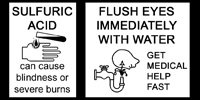 If the electrolyte isn't allowed to sulfate, the other option is to neutralize the acid and turn it into water (baking soda works well). No kidding. Have you ever poured a water/baking soda solution over your car's corroded terminals? Works like a charm. Afterward, the newly formed water can either be sent to a water purification plant and distributed back into the local water system, or is can be re-used as the base for a new electrolyte solution (65% water, 35% sulfuric acid).
If the electrolyte isn't allowed to sulfate, the other option is to neutralize the acid and turn it into water (baking soda works well). No kidding. Have you ever poured a water/baking soda solution over your car's corroded terminals? Works like a charm. Afterward, the newly formed water can either be sent to a water purification plant and distributed back into the local water system, or is can be re-used as the base for a new electrolyte solution (65% water, 35% sulfuric acid).
As you can see, battery recycling works. It's safe for the environment, and good for business. With the ability to make new batteries from the old batteries, we can ensure that supply of lead acid batteries will never be low. If you have any old batteries that have been sitting on your garage floor or in your shed for years, please take the time to recycle them at your local battery retailer or any battery reseller. They'll take care of the rest.
